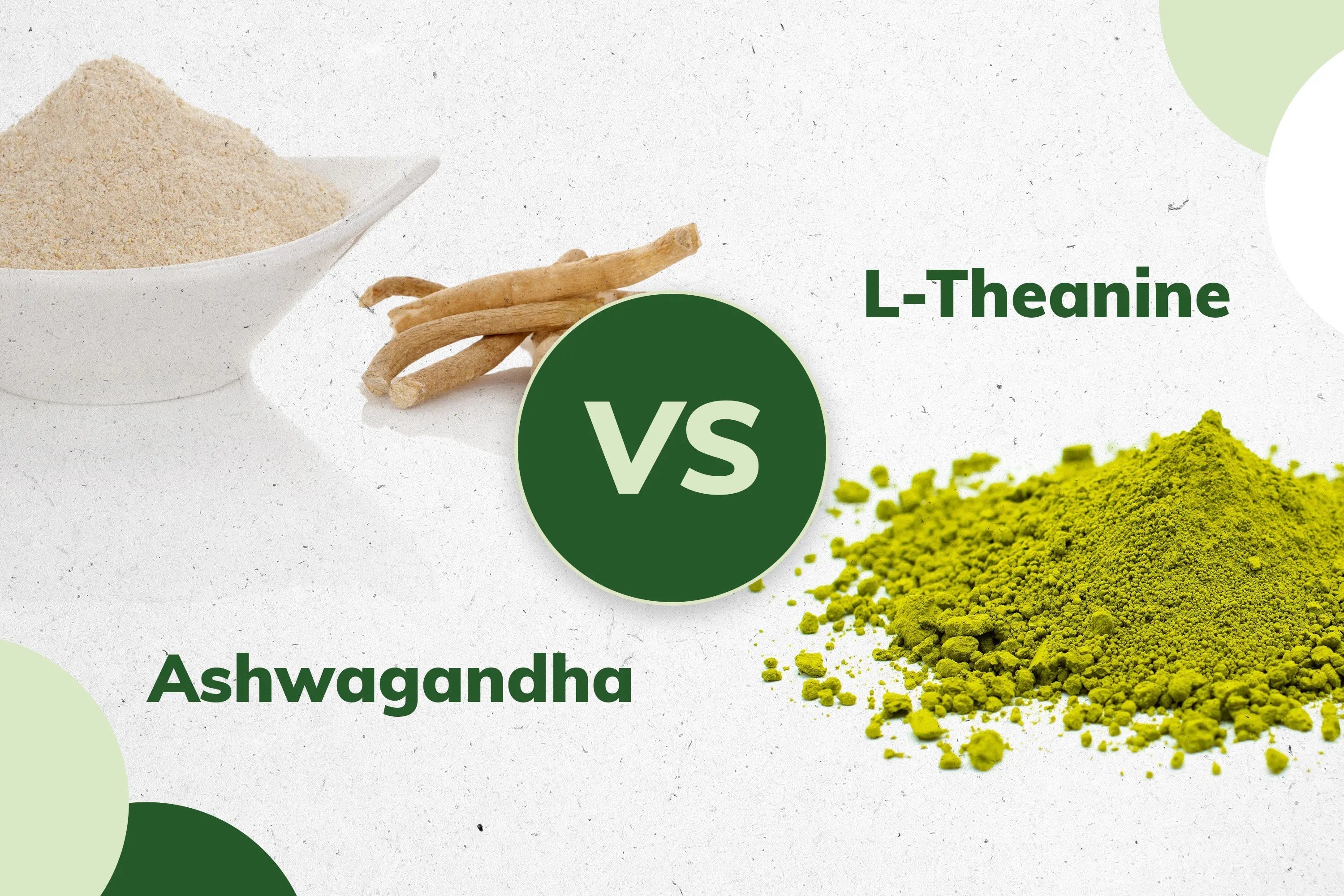When it comes to choosing dietary supplements to help reduce anxiety and stress, people often compare ashwagandha vs l-theanine for their calming effects on the human body. If you’re confused about choosing which supplement is right for you between ashwagandha and l-theanine, then explore with us till the end.
In this article, we’ll compare ashwagandha vs l-theanine mainly regarding their potential benefits and possible side effects. But before we get into the difference between ashwagandha and l-theanine, first, we’ll need to know the basics of these two supplements in a bit more detail. So, let’s get started.
What is Ashwagandha?
Ashwagandha is a medicinal herb botanically known as Withania somnifera. It is an evergreen shrub that usually grows across India, the Middle East, and Africa. The plant is also known as winter cherry. Ashwagandha has a long history of medicinal use in traditional medicines as a potent anti-inflammatory and an aphrodisiac.
Ashwagandha is one of the most sought-after herbal adaptogens throughout the world, meaning it can help the body adapt and respond according the anxiety and stress. The major active ingredients in ashwagandha may include approximately 12 alkaloids and 40 withanolides. Today, ashwagandha is used to manage and prevent a range of health conditions including anxiety, stress, sleep issues, aging, and more.
What is L-theanine?
L-theanine is a potent amino acid that is commonly found in teas and mushrooms. Today, l-theanine is widely used as a dietary supplement to lower stress and manage anxiety. Tea leaves and mushrooms containing l-theanine have a long history of medicinal use in traditional and folk medicines.
L-theanine and other amino acids are mainly used as a supplement to promote relaxation and increase mental clarity. In many energy drinks like Monster and Red Bull, l-theanine is a common ingredient.
L-theanine has been shown to increase the production of dopamine and serotonin in the brain. It is also beneficial for improving alpha and beta brain wave patterns.
Ashwagandha vs L-theanine: Potential Benefits
Potential Benefits of Ashwagandha
Scientists have long studied Ashwagandha to explore its medicinal and therapeutic qualities. Below are a few of the most common potential benefits of ashwagandha:
Ashwagandha may Help Manage Stress
Multiple studies show that ashwagandha exhibits anti-anxiety (anxiolytic) and adaptogenic effects. For instance, in a 2019 randomized, double-blind, placebo-controlled clinical study, researchers concluded that ashwagandha root extract was beneficial in reducing anxiety and stress in healthy adults. For sure, ashwagandha is not the only one for reducing anxiety; check out other herbs for stress and anxiety.
Ashwagandha may Help Combat Insomnia
There is also a significant amount of evidence that ashwagandha may help combat symptoms of insomnia and other sleeping problems. One 2019 study published in Cureus showed that ashwagandha extract is a natural ingredient with sleep-inducing potential. It can help improve sleep onset latency and sleep quality in patients with insomnia at a dose of 300 mg of standardized extract of ashwagandha twice daily. Remember to keep calm for sleep improvement, and read more about herbs for calmness.
Ashwagandha may Help Improve Immune Functioning
Studies suggest that the roots and leaves of the ashwagandha plant may help improve immune functioning. They can help stimulate in production and functioning of antibodies that play a major role in the immune system defence.
Potential Benefits of l-theanine
L-theanine is a popular dietary supplement, especially in the natural health community with many potential benefits. Some are as follows:
L-theanine may Help Relieve Anxiety
Just like ashwagandha root, l-theanine also has anti-anxiety and stress-reducing properties. According to a 2016 review article published in Beverages, l-theanine has the capacity to reduce cortisol levels in the brain and may help reduce daily stress.
L-theanine may Help Improve Focus
L-theanine may help improve cognitive functions as well as overall mental health. It helps promote alpha wave activity in the brain which may have an effect on focus and alertness levels.
L-theanine may Help Reduce Blood Pressure
L-theanine may also help lower blood pressure levels, especially in stressful situations. Studies have shown that l-theanine not only can lower anxiety but also helps lower blood pressure increase in stress-response people.
Ashwagandha vs l-theanine: Possible Side Effects
Both ashwagandha and l-theanine are generally safe and well-tolerated. But a few side effects may occur in some people:
Possible Side Effects of Ashwagandha
- Headaches
- Indigestion
- Stomach upset
- Nausea
- Excessive sleepiness
- Diarrhea
Possible Side Effects of l-theanine
- Stomach upset
- Indigestion
- Headaches
- Irritability
- Jitters

Can you Take Ashwagandha and l-theanine Together?
Although there are very few studies that observed the effects of combined doses of ashwagandha and l-theanine, many popular health supplements combine them in the same product. So, yes, you can take them together. However, we still need some more research.
Final Words
Both ashwagandha and l-theanine are effective agents for reducing anxiety and stress. If you’re looking for something that can also help increase strength and stamina, ashwagandha might be a better choice. But if you’re looking for something that can also help improve mental clarity and cognitive function, l-theanine might be a better fit.
Discover everything you need to know about ashwagandha on our blog. Don't miss out on the opportunity to learn more about this amazing herb.





Share:
Elderberry Benefits for Infants: A Natural Boost for Little Ones
Kelp Vs Seaweed